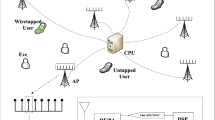Abstract
Security in wireless communication systems is paramount for safeguarding the privacy of users. Typically, security measures are implemented on higher layer and rely on encryption codes based on private and public keys. However, this often results in information overhead, compromising service bit rates and both spectral and energy efficiency. Alternatively, physical layer security schemes offer a viable solution. One advantage is their compatibility with higher-layer security protocols, ensuring security without sacrificing spectral or energy efficiency. A physical layer security scheme employing the Quantized Digital Amplification (QDA) technique offers both simplicity and high secrecy. This approach efficiently handles high Peak-to-Average Power Ratio (PAPR) signals, commonly utilized to achieve high spectral efficiencies. By combining low complexity with robust security, QDA ensures spectral efficiency while maintaining secrecy. Analyzing various scenarios demonstrates the effectiveness of implementing such a security scheme at the physical layer.
Access this chapter
Tax calculation will be finalised at checkout
Purchases are for personal use only
Similar content being viewed by others
References
Massey, J.L.: An introduction to contemporary cryptology. Proc. IEEE 76(5), 533–549 (1988)
Schneier, B.: Cryptographic design vulnerabilities. IEEE Comput. 31(9), 26–33 (1998)
Barenghi, A., Breveglieri, L., Koren, I., Naccache, D.: Fault injection attacks on cryptographic devices: Theory, practice, and countermeasures. Proc. IEEE 100(11), 3056–3076 (2012)
Harrison, W.K., Almeida, J., Bloch, M.R., McLaughlin, S.W., Barros, J.: Coding for secrecy: an overview of error-control coding techniques for physical-layer security. IEEE Signal Process. Mag. 30(5), 41–50 (2013)
Shi, W., Jiang, X., Hu, J., et al.: Physical layer security techniques for data transmission for future wireless networks. Secur. Safety 1, 2022007 (2022)
Hamamreh, J.M., Furqan, H.M., Arslan, H.: Classifications and applications of physical layer security techniques for confidentiality: a comprehensive survey. IEEE Commun. Surv. Tutorials, 21(2), 1773–1828 (2019)
Montezuma, P., et al.: Apparatus for quantized linear amplification with nonlinear amplifiers. USPTO Patent application number US10069467B1
Montezuma, P., Dinis, R.: Implementing physical layer security using transmitters with constellation shaping. Proc. IEEE ICCCN2015, Las Vegas, NV, US, (2015)
Viegas, P., et al.: A highly-efficient amplification scheme for OFDM signal. IEEE VTC’21 (Spring)), Helsinki, Finland (2021)
Araújo, T., Dinis, R.: Analytical evaluation of nonlinear distortion effects on multicarrier signals. CRC Press (2015). https://doi.org/10.1201/b18370
ETSI, LTE; Evolved Universal Terrestrial Radio Access (E- UTRA); Base Station (BS) radio transmission and reception, ETSI TS 136 104 V8.3.0 (2008–11)
Leinonen, M.E., Jokinen, M., Tervo, N., Kursu O., Pa¨rssinen, A.: System EVM characterization and coverage area estimation of 5G directive mmW Links. IEEE Trans. Microwave Theory Tech. 67(12), 5282–5295 (2019)
Acknowledgments
This work was supported by Koala Tech, by Fundação para a Ciência e Tecnologia and Instituto de Telecomunicações under project UIDB/50008/2020.
Author information
Authors and Affiliations
Corresponding author
Editor information
Editors and Affiliations
Rights and permissions
Copyright information
© 2024 IFIP International Federation for Information Processing
About this paper
Cite this paper
Viegas, P., Montezuma, P., Dinis, R., Guerreiro, J., Oliveira, J.P. (2024). Quantized Digital Amplification Physical Layer Security Schemes. In: Camarinha-Matos, L.M., Ferrada, F. (eds) Technological Innovation for Human-Centric Systems. DoCEIS 2024. IFIP Advances in Information and Communication Technology, vol 716. Springer, Cham. https://doi.org/10.1007/978-3-031-63851-0_14
Download citation
DOI: https://doi.org/10.1007/978-3-031-63851-0_14
Published:
Publisher Name: Springer, Cham
Print ISBN: 978-3-031-63850-3
Online ISBN: 978-3-031-63851-0
eBook Packages: Computer ScienceComputer Science (R0)





